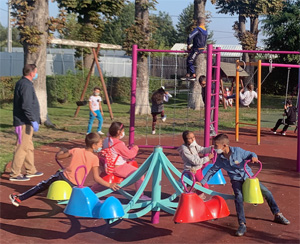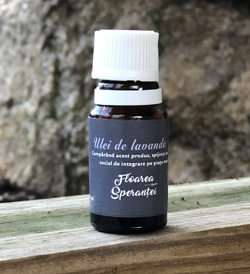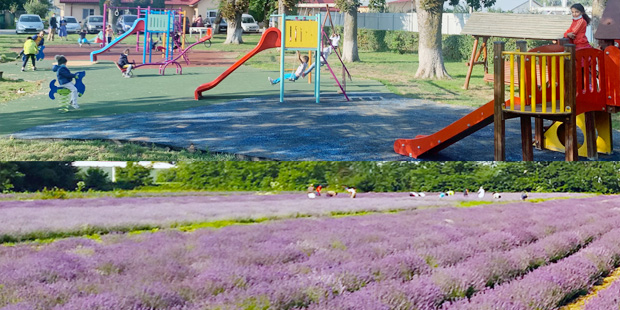St. Anthony of Padua Playground and lavender production helps the Friars deliver joy and hope to the poor of Romania
by Gary Adornato
What is more pleasant than the infectious sound of children laughing? What is more soothing than the sweet smell of lavender?
You would be hard pressed to top either pleasantry and both are at the heart of some amazing work being done by the Conventual Friars in the eastern European nation of Romania.
The epicenter of this work is the Sociale Centre (Social Center) in the town of Roman, which is in northeastern Romania. The Sociale Centre is operated by the Fundatia Umanitara Pacea (Humanitarian Foundation for Peace) and dedicated to the education of poor children. It was founded in 2000 by the Conventual Friars in Romania and also provides services related to proper hygiene, skills training for job creation and social skills dedicated to helping the poor and illiterate citizens of Roman.
“Part of the Sociale Centre is an education unit that holds 80 children,” said Fr. Lucian Bobarnac, OFM Conv, a native of Romania’s capital city of Bucharest who joined the order in 2001 and who was ordained a priest in 2008. “Half of them are enrolled in our kindergarten and the other half are in the primary school. Every day they are transported back and forth by our school bus and here they receive, apart from an education, two meals per day (breakfast and lunch).”
The children also find something very rare in their daily lives… pure joy.

The young children who are students at the Sociale Center in Roman, Romania, got a huge surprise when they returned to school in early September – a beautiful new playground.
Within the last month, in the garden at the Sociale Centre, the construction of a beautiful, modern playground, commissioned by the Friars and known as the St. Anthony of Padua Playground, was completed.
“All of these children come from a very poor and dirty environment, at home. They have no playground, nor any other means of playing outside, just mud and dirty premises,” added Fr. Lucian, who serves as the President of Fundatia Umanitara Pacea. “When they come to school they already feel like they are in paradise, compared to what they have at home and we noticed in them a big desire to play in our garden and on our sports field.
“Before this playground we had in the garden another old, basic and very deteriorated playground that the friars built, as they could, some 15 years ago. Therefore we thought that a new and bigger playground would do them very good and indeed it did. Since we have them back to school it’s hard for the teachers to get them back into the classrooms because they never have enough playing.”
Fr. Lucian expanded on the impact the playground will have on these children’s lives.
“Considering that these kids are very, very poor, they are marginalized by the Romanian society (because of being “dirty roma”). They are often physically abused at home. It’s an oasis of joy being here at school, having something to eat, and being able to play as they want. We never thought that such a thing, like a playground, could bring so much joy and happiness to the children, but, being aware of their background and environment, we now realize that this new addition to our Sociale Centre is exactly what they, just like every other child in the world, need. Their happiness is also our assurance that what we try to do for them, it really makes a positive difference in their lives.”
Not far from the playground and the Sociale Centre, in a big field owned by the Friars’ Romanian Province, another Romanian miracle is blooming and being nourished by the Friars.

The essential oil produced from the lavender grown by the Friars in Romania is providing work and hope for a brighter future for the poor citizens of the local community.
The field had traditionally been used as a nursery for ornamental plants. It is near the slums where most of Roman’s poorest people live. As a business it was not thriving because not many people in the area could afford to buy plants and nothing was being produced that could be planted in fields or greenhouses. However, Fr. Lucian came up with an idea, about five years ago which is changing everything.
“I employed some Roma people who were not welcomed anywhere else to work because of the stigmata of being Roma and because of being unqualified and illiterate,” said Fr. Lucian. “We thought to also plant some lavender plants and then produce lavender oil in order to sell more products.”
Lavender is a perennial herb known for the exotic perfumes it produces. However, it also produces what is widely recognized as one of the most useful essential oils, known to help relieve headaches, insomnia, tension and stress. It’s therapeutic properties have been celebrated all over the world.
To get his project off the ground, Fr. Lucian approached a non-governmental agency in Sweden, which agreed to pay the salaries of eight people for six months, allowing time for these individuals to gain some experience and skill in the nursery. After this period was finished, the company agreed to fund the employment of two persons per year. Those two employees, as well as two additional ones, are now employed, on permanent contracts, by the nursery.
The lavender flower being grown in Roma is being distilled to produce lavender oil and water, which is being sold. The Swedish Lutheran Church has also sold the products in Swedish churches, but that revenue has been cutoff this year because of the global Covid-19 pandemic.
Fr. Lucian would love to see the benefactors of the Franciscan Mission Association (FMA) support the lavender project by purchasing some of the products, at least until the pandemic passes and the Swedish Lutheran Church can get back to normal with its orders. Online purchases are not yet available, but those interested can learn more by visiting https://www.greentime.ro or contacting the office at office@greentime.ro where you can get assistance on making purchases.
“We also sell a few here in Romania and in Germany, but it’s nothing comparing to the orders we used to get in the past from the Swedish Church,” said Fr. Lucian. “For example, we make about 70 liters of oil, that means we can fill about 7,000 bottles of oil (10 ml per bottle) and nearly half of this quantity we used to send in Sweden until this year.”
The funds generated by the oil sales are currently used exclusively to pay the salaries of the local nursery workers and repopulate the field with new plants. As the program grows, funds will also go towards arranging the field, putting in an irrigation system and purchasing special machines that are used for planting and digging. Long term, it is hoped that the funds can also support some of the needs of the Province, including the formation of young Friars in their friaries, as well as special projects.
The Franciscan Mission Association (FMA), founded in 1924, supports the missionary work of our Friars in Romania and more than 60 countries across the globe. If you would like to help, please click here to reach the FMA donation page. Your support is critical and greatly appreciated.
Pictured above: (Top) Children at play on the brand new St. Anthony of Padua Playground at the Franciscan run Sociale Centre in Roman, Romania. At a nearby nursery (bottom), also run by the Friars, poor local residents find work and hope by working the fields and harvesting rows of lavender grown there.

